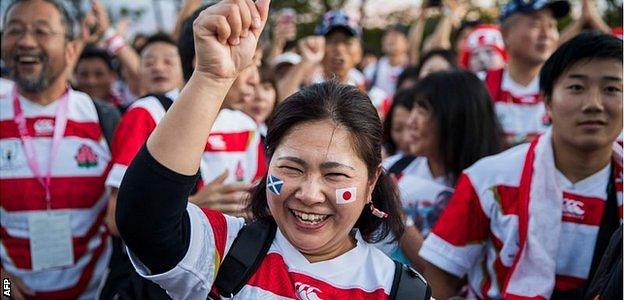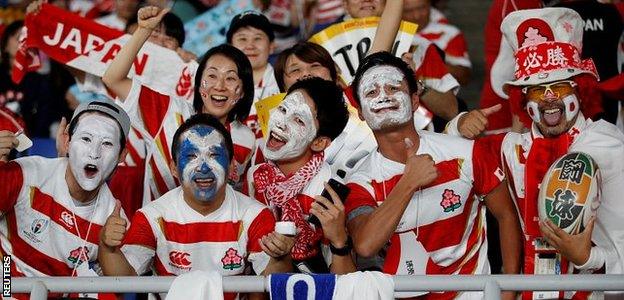Japan: Rugby World Cup quarter-final spot gives fans reason to smile after Typhoon Hagibis
- Published

Japan players bowed to the crowd after beating Scotland to reach the World Cup quarter-finals
Red and white stripes everywhere, dogs in rugby shirts, wigs, paper scrum caps and a smile. Always a smile.
Japan may have qualified for a first World Cup quarter-final by beating Scotland but their fans long ago sealed their place as the best in the tournament.
It has not been an easy 48 hours for the country. Japan's biggest typhoon in 61 years tore through several regions on Saturday, leaving at least 23 people dead.
But on Sunday morning, the skies had cleared, the sun shone and Japan showed the resilience it takes to live in a country constantly battered by natural disasters.
Among rugby fans, talk turned to whether the team's decisive World Cup match against Scotland would go ahead or not.
Videos on social media, external on Saturday had already shown the Japan team wading through knee-high water to get to the field at their flooded training ground.
Away from the pitch, the Scottish Rugby Union had made their feelings clear on a possible cancellation and Japan head coach Jamie Joseph demanded more respect for his side, saying they were desperate to play too.
Images on the news of roads submerged in flood water and houses with roofs blown off made play seem impossible and submerged flood plains around the stadium did not look promising either.
There was no need for doubt given the ingenuity of the Japanese, though. The stadium was built on stilts and so was safe. The game would go ahead.
Some may have questioned the decision to bring the tournament to a country where such extreme weather can make matches unplayable, but the scenes at Yokohama should surely put those thoughts out of people's minds.
Fans flocked to the 72,000-capacity ground hours before kick-off and the scene they created was the ray of joy the country needed after the typhoon.

Japan supporters have rallied around their team from the start of the tournament
More and more red and white shirts gathered. A sense of history was in the air and the locals knew it - long queues formed for programmes and the merchandise shop.
Japan might have been about to seal a place in the Rugby World Cup quarter-finals for the first time and everyone wanted a souvenir to take away with them.
A historic win against South Africa at the 2015 World Cup was the catalyst for increased interest in the Japan team four years ago, but no such catalyst was needed at this tournament.
Japan shirts have long been sold out at stores across the country and the expected television audience for Sunday's match was an estimated 50m people.
If this game had been cancelled, the World Cup would have been a darker place. But the jeopardy around whether it would be played or not, combined with the fact that everyone had been forced to spend the previous 24 hours indoors for their own safety, meant supporters were ecstatic to be there.
The extra time spent inside clearly gave fans time to plan their outfits - a rugby shirt is just not enough for Japanese supporters.

Japan's fans love to dress up in their team's colours
There were rugby-themed kimonos, wigs in the colours of the Japan flag and even rugby earrings on show.
And of course Bak-san, a fan who has earned celebrity status, external at this World Cup by painting shirts on his torso at games, made an appearance.
As fans waited for kick-off in front of the ground, a rendition of Flower of Scotland broke out and it was not just Scottish fans singing.
Inside the stadium, the sense of anticipation heightened as the players emerged onto the pitch. A moment's silence was held in memory of those who had died in the typhoon and the poignancy was carried through to the Japanese national anthem.
The television cameras showed tear-stained faces in the crowd as they sang the sombre tune with a level of emotion not often seen in such a reserved and polite culture.
Chants of 'Nippon', the Japanese word for Japan, broke out straight after kick-off and every hit was met with a huge cheer, except for tackles made by New Zealand-born Michael Leitch.
Each time the Brave Blossoms captain - a hero in his adopted country ever since that win against South Africa - so much as approached the ball a prolonged cry of 'Leitch' would ring out.
Even scrum penalties won sent the crowd into raptures and it was not just those inside the stadium invested in every twist and turn of the game.

Supporters watching at a fan zone in Tokyo screamed with delight when their team won
In Oita, where England and Wales will play their quarter-finals, bars were full of screaming fans, while at Tokyo's famous Shibuya crossing, fans streamed into the middle of the road in celebration at the end.
Japan were a team with a nation behind them and those inside the stadium in Yokohama made themselves heard.
There were howls of pain as Scotland's Finn Russell went over for the first try then shrieks of delight when Japan drew level with Kotaro Matsushima's score.
Japanese fans had already won many hearts, but on the pitch Japan play a loveable brand of rugby too and another glorious offload meant Keita Inagaki was the next man to cross.
Kenki Fukuoka, who was eventually given his man of the match award by fellow Japanese sporting great Naomi Osaka, scored twice and it felt increasingly clear that Japan had earned a place in the last eight.

Kenki Fukuoka celebrates after scoring his side's third try in a stunning first-half display
But WP Nel's try for Scotland seven minutes later ramped up the anxiety and spirits reached their lowest level after a leaky defence allowed Zander Fagerson through.
The crowd regrouped and willed Japan on, roaring relentlessly for the final five minutes of the game. They counted the final five seconds down until the ball was kicked into the stands and they exploded into ecstasy and, in some cases, tears.
The response to the win from both players and fans showed that this match was closer to a World Cup final than a pool game for Japan.
The post-match celebrations continued for half an hour after full-time as the team lined up to bow to every side of the stadium and fans chanted their country's name in response.
The players gathered for a photo with the crowd behind them before forming a circle and singing, not wanting their time on the pitch to end.
Eventually, just seven players were left kneeling in a huddle, with Leitch doing the talking. And as they finally left the pitch, it was with a joyful wave to the crowd.
It has been a trying 48 hours for the Japanese population, but those in Yokohama on Sunday were still smiling. And now they have even more reason to.
